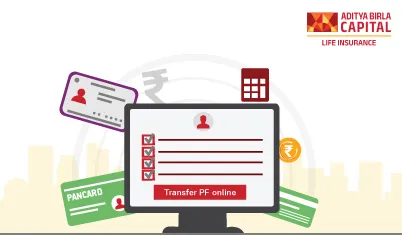Aditya Birla Sun Life Insurance Company Limited
How to Get Tax Benefits From Your Insurance?

Plan Smarter, Live Better!

Thank you for your details. We will reach out to you shortly.

Currently we are facing some issue. Please try after sometime.


- Table of Contents
Due to the rising healthcare expenditure, you and your family must have health insurance. It would help if you had medical insurance, young or elderly, to guard against escalating medical costs. The government promotes the purchase of health insurance and allows you to deduct the cost of your premiums from your taxes. Continue reading to learn more about claiming tax deductions for medical insurance policies.
What Exactly is Insurance?
Insurance is a contract (in the form of a policy) between you and an insurance company under which the firm commits to pay you for any financial loss(es) resulting from particular covered occurrences.
In return for the financial security provided, you agree to pay the insurance company a certain amount known as premiums. Insurance is the most effective method of risk management, intended to protect against the danger of unforeseeable loss.
Life insurance, health insurance, auto insurance, property insurance, business insurance, and other forms of insurance are available. Aside from financial security insurance, you may also claim tax breaks on your premiums.
Tax Advantages of Life Insurance
The insurance company guarantees to pay a specified quantity of money (known as the sum promised) to the nominee(s) of the covered person if the policyholder dies within the policy term. Some plans, notably endowment, money back, and whole life policies, payout maturity benefits to the insured if the individual outlives the policy term.
01 Section 80C: Premiums paid on a life insurance policy, such as an endowment, whole life, money-back policy, term insurance policy, or Unit Linked Insurance Plan, are tax-deductible under Section 80C of the Income Tax Act of 1961. The highest deduction available is ₹1,50,000.
Tax deductions on life insurance premiums may be claimed under Section 80C of the Income Tax Act of 1961 for premiums paid to insure self, spouse, dependent children, and any member of the Hindu Undivided Family.
It's worth noting that if the insurance is issued on or before March 31, 2012, yearly premiums up to 20% of the total guaranteed are tax deductible. Annual premiums up to 10% of the amount guaranteed are tax deductible for insurance plans established on or after April 1, 2012.
02 Section 80CCC: A tax deduction may be claimed under Section 80CCC of the Income Tax Act, 1961, for any sum paid into a Life Insurance Corporation of India or other insurance company's annuity plan to get a pension. The highest deduction allowed under this provision is ₹150,000.
03 Section 10(10D): Income Tax Act Section 10(10D) exempts you from paying taxes on the amount you receive from the life insurance provider. Subject to certain restrictions, the amount of sum guaranteed and bonus (if any) paid on policy maturity, or surrender or death of the life insured are fully tax exempt in the hands of the receiver under this clause.
Benefits from Health Insurance Taxes
Individuals and Hindu Undivided Families (HUF) may qualify for a tax credit on the cost of their health insurance premiums under Section 80D of the Income Tax Act of 1961. You may get a health insurance plan and claim tax deductions for the premiums you pay if your yearly income is taxable.
Whether you purchase a family floater or an individual plan, you may benefit from the tax advantages. Along with safeguarding you from growing health care expenses, it helps you save your hard-earned money.
How Can I Claim Tax Advantages for My Health Insurance Policy?
When you submit your Income Tax Returns (ITR) for the relevant financial year, you must include a tax advantage for medical insurance. To get the tax advantages related to health insurance, follow these procedures.
- To claim tax deductions on health insurance premiums, you must choose 80D in the "Deductions" column when submitting your ITR.
- Select the conditions for the deduction you are requesting. The selection criteria are listed below.
- Family and Oneself
- Family and Self (above 60 Years)
- Parents plus Self
- Parents (Above 60 years)
- Parents, family, and the self
- Self, family, and parents over the age of 60
- Individuals (over 60), family, and parents over 60
- Include supporting documentation (the premium payment receipt) so that the Income Tax Department may evaluate the paperwork.
Eligibility for Medical Insurance Tax Deductions
Here are the requirements for claiming a tax deduction for a health insurance plan under Section 80D of the Internal Revenue Code of 1961.
- People who have purchased medical insurance for their spouse, their dependent children, or their parents
- Hindu Undivided Family Member (HUF)
Tax Advantages for Long-term Health Insurance
In a multi-year medical insurance plan, the premium amount is fixed for the duration of the policy. As a result, you may safeguard yourself against a possible premium hike during renewals. You may apply for the multi-year plan's tax exemption each year.
If you bought ₹45,000 for just a 3-long health insurance plan, you might receive the tax-exempt status of ₹15,000 per year.
Paying for Health Insurance Premiums
These are the options for paying the medical insurance plan's premium. Please be aware that cash contributions will not qualify for tax advantages.
- Online: (Debit/Credit) Net Banking
- Cheque
- Cash
- Request Draft
Benefits of Using Tax Deductions for Medical Insurance
The benefits of tax deductions for health insurance are listed below.
- Reduces costs
- Raises the take-home pay (salaried individuals)
- Claim a tax break of up to ₹1 lakh
Conditions Related to Claiming Tax Breaks on Life and Health Insurance Policies
- Although you may pay your health insurance premiums in cash, you will not be able to get tax advantages since income tax regulations prohibit tax deductions for premiums paid in cash.
Consequently, you are advised to pay premiums via check, online banking, draught, or credit card to take advantage of the tax benefit on premiums. Section 80D allows a tax deduction for cash expenditures for preventative health check-ups. - To claim a Section 80C tax deduction, ensure the premium paid during the fiscal year does not exceed 10% of the total guaranteed. If it exceeds this threshold, the benefits you may claim will be restricted to 10% of the amount insured. In the event of Section 10(10D), tax exemption is conditional on the premium not exceeding 10% of the total guaranteed.
- Tax deductions under Sections 80C and 80D may be claimed only for the years in which the premiums were paid. If you choose a single premium life insurance policy, you may only claim Section 80C tax advantages once in the year you pay the premiums.
Tax Benefit for Seniors' Health Insurance
- Claim an annual tax exemption of up to ₹50,000.
- For each fiscal year, you may claim a tax exemption of up to ₹5,000 for preventative health exams.
Conclusion
Insurance is a kind of security that allows you to provide for the people you care about in the event of your death. It is not just about giving people money but also financial security. An insurance policy provides tax advantages, which may benefit individuals saving for retirement or their children's education, among other things.
It is critical to evaluate your requirements before deciding whether or not to add dependent parents to get the most significant tax advantage. To avoid missing benefits, claim tax exemption when completing your income tax return.
Thank you for your details. We will reach out to you shortly.
Thanks for reaching out. Currently we are facing some issue.
Buy ₹1 Crore Term Insurance at Just ₹575/month1
ABSLI DigiShield Plan
Life cover up to 100 years of age.
Joint Cover Option
Inbuilt Terminal Illness Benefit
Tax Benefit^
Return of Premium Option~
Life Cover
₹1 crore
Premium:
₹575/month1
Most Popular Calculator
Guaranteed returns after a month¹
ADV/9/22-23/1585







